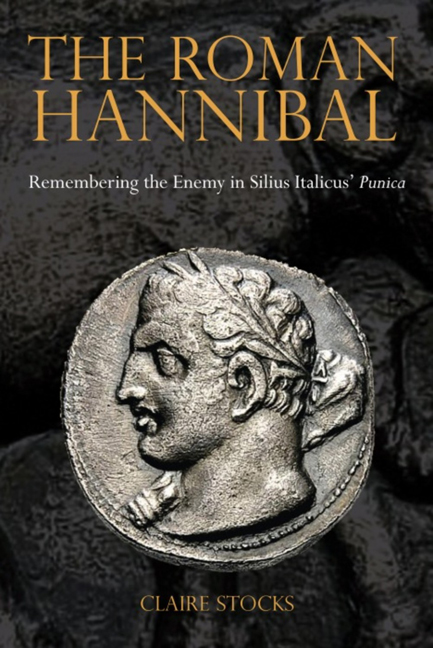Book contents
- Frontmatter
- Contents
- Acknowledgements
- Texts and Translations Used
- Introduction: Silius Italicus and the Roman Hannibal
- Chapter One The Roman Hannibal Defined
- Chapter Two Before Silius: The Creation of the Roman Hannibal
- Chapter Three Silius' Influences
- Chapter Four Epic Models
- Chapter Five Silius' Roman Hannibal
- Chapter Six Out of the Darkness and into the Light
- Chapter Seven Hannibal's Decline after Cannae: Separating Man from Myth
- Chapter Eight Imitators and Innovators
- Chapter Nine Band of Brothers
- Chapter Ten The ‘Lightning Bolts’ (Fulmina) of War
- Chapter Eleven The Man and his Myth: The Self-Defined Roman Hannibal
- Conclusion: The Crossing of the Worlds: The Move from Internal to External Narrative
- Bibliography
- General Index
- Index locorum
Chapter Two - Before Silius: The Creation of the Roman Hannibal
- Frontmatter
- Contents
- Acknowledgements
- Texts and Translations Used
- Introduction: Silius Italicus and the Roman Hannibal
- Chapter One The Roman Hannibal Defined
- Chapter Two Before Silius: The Creation of the Roman Hannibal
- Chapter Three Silius' Influences
- Chapter Four Epic Models
- Chapter Five Silius' Roman Hannibal
- Chapter Six Out of the Darkness and into the Light
- Chapter Seven Hannibal's Decline after Cannae: Separating Man from Myth
- Chapter Eight Imitators and Innovators
- Chapter Nine Band of Brothers
- Chapter Ten The ‘Lightning Bolts’ (Fulmina) of War
- Chapter Eleven The Man and his Myth: The Self-Defined Roman Hannibal
- Conclusion: The Crossing of the Worlds: The Move from Internal to External Narrative
- Bibliography
- General Index
- Index locorum
Summary
Examining the Carthaginian texts:
The tale Hannibal might have told
The Roman Hannibal emerges as a natural by-product of victor literature: Rome wins the war, and survives to tell the tale in the way that it wishes to tell it. But behind the Roman façade lie traces of a Carthaginian and Greek story, remnants of the life-story that Hannibal wished to tell about himself via the Greek works of his own historians, Silenus from Cale Acte in Sicily and Sosylus from Sparta, who travelled with him and lived in his camp. That Hannibal had historians travelling with him suggests a preoccupation with his legacy congruent with Silius’ portrayal of him as a man obsessed with destiny (e.g. Pun.6.698–716). As Greek historians, their work was designed to reach beyond a Punic audience and so suggests that Hannibal was embracing Hellenism in the advancement of his legacy. Sosylus allegedly encouraged Hannibal in these Hellenistic pursuits (Nep.Hann.13.3), and Hannibal himself appears to have been fluent in Greek, possibly even Latin, communicating in the language with Philip of Macedon when they signed a treaty (Polyb.7.9) – the closest we are likely to come to reading Hannibal's own words.
Very little remains of Silenus and Sosylus’ works save for fragments of papyri and faint allusions in the texts of later Roman authors. Yet the fact that these texts survived in antiquity and influenced later writers demonstrates the possibility of reading a Hannibal-sanctioned, and hence Carthaginian, source behind this very Roman Hannibal. One such instance of this influence is a fragment of Silenus that refers to a dream of Hannibal, and is preserved in Rome's literature, via Coelius Antipater, by Cicero:
Hoc item in Sileni, quem Coelius sequitur, Graeca historia est (is autem diligentissume res Hannibalis persecutus est): Hannibalem, cum cepisset Saguntum, uisum esse in somnis a Ioue in deorum concilium uocari; quo cum uenisset, Iouem imperauisse, ut Italiae bellum inferret, ducemque ei unum e concilio datum, quo illum utentem cum exercitu progredi coepisse; tum ei ducem illum praecepisse ne respiceret; illum autem id diutius facere non potuisse elatumque cupiditate respexisse; tum uisam beluam uastam et immanem circumplicatam serpentibus, quacumque incederet, omnia arbusta, uirgulta, tecta peruertere, et eum admiratum quaesisse de deo quodnam illud esset tale monstrum, et deum respondisse uastitatem esse Italiae praecepisseque ut pergeret protinus, quid retro atque a tergo fieret ne laboraret.
- Type
- Chapter
- Information
- The Roman HannibalRemembering the Enemy in Silius Italicus’ Punica, pp. 13 - 34Publisher: Liverpool University PressPrint publication year: 2014



